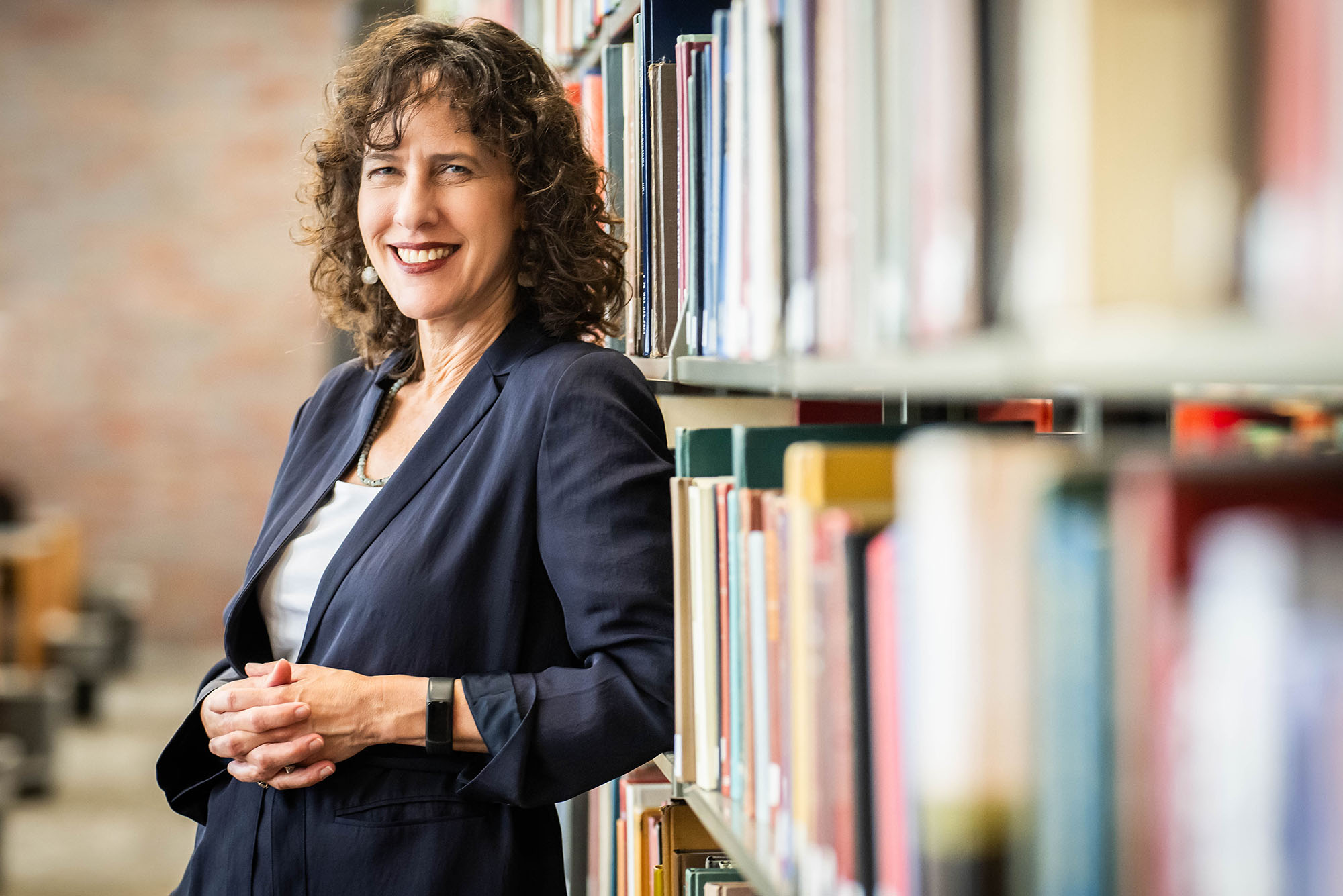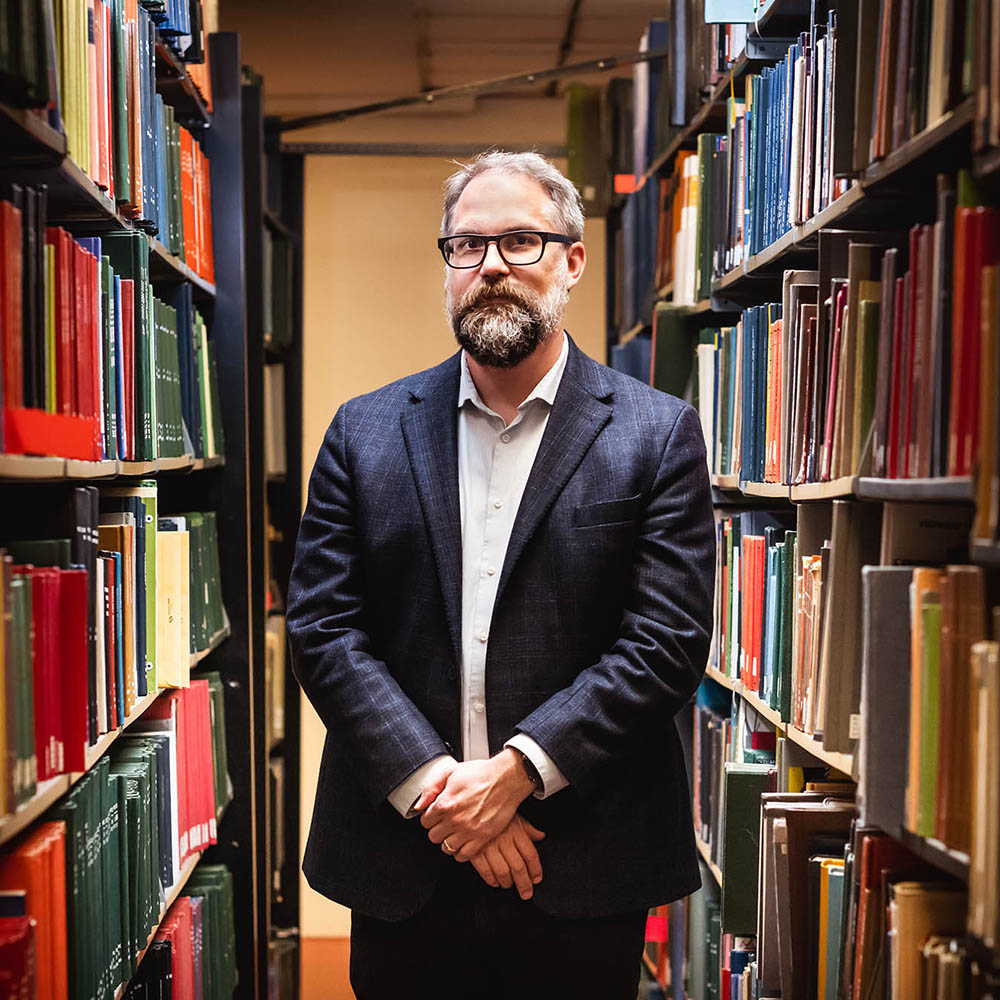BU Names Jennifer Gunter King First Associate University Librarian for Special Collections
Among her goals: improve access for scholars, researchers, and the entire BU community

Jennifer Gunter King’s mission as BU’s associate university librarian for special collections involves a lot more than tending the Howard Gotlieb Archival Research Center.
BU Names Jennifer Gunter King First Associate University Librarian for Special Collections
Among her goals: improve access for scholars, researchers, and the entire BU community
Her vast domain includes nearly 12 miles of archival boxes holding papers like a handwritten blue book by Martin Luther King, Jr. (GRS’55, Hon.59) for a Boston University class, hundreds of letters between Ethel and Julius Rosenberg penned at Sing Sing prison before their execution, African Ajami manuscripts, and Florence Nightingale’s handwritten letters to military generals about the importance of sanitation, along with more than 45,000 BU theses and dissertations, open access scholarly articles, research publications, and other works by faculty, students, and staff.
Her biggest job now may be getting you to use them.
Jennifer Gunter King was hired effective April 1 as associate university librarian for special collections, overseeing the Howard Gotlieb Archival Research Center and all other special collections and directing the BU Libraries new Digital Ventures program. She’s tasked with improving access to the special collections and better integrating them into the University as a whole.
“I’m working with the team here to not only restore services, but [also] to take a big step forward in the services we believe will be the most meaningful for the Boston University scholar and research community, including undergraduates,” King says.
“A vision is forming of how we can take the necessary steps to broaden our services,” she says, “and that will require a lot of collaboration throughout the libraries and a lot of support from the University community in terms of active partnership.”
Currently the special collections are open to scholars by appointment on Mondays and Tuesdays. King wants to make them available every day. But coming back from pandemic restrictions, capacity limitations, and administrative changes in recent years is just the beginning of her mission.

“I’ve been giving a lot of thought to the place of special collections in the future of our libraries,” says University Librarian Mark Newton. “The first order of business is to elevate our special collections program, and advance engagement of research and learning communities here at BU and beyond, with the very extensive holdings that we have.”
Many scholars are familiar with the highlights of those holdings—notably collections focused on the papers and artifacts of Nobel Laureates Martin Luther King, Jr. and Elie Wiesel (Hon.’74), as well as Howard Thurman (Hon.’67), the former dean of Marsh Chapel and the first Black dean at a mostly white American university. But that’s just the tip of an iceberg that comprises roughly 2,000 individual collections in the Gotlieb and elsewhere within BU.
“The one thing that I am constantly hearing from students and faculty alike is, ‘I had no idea this was here,’” Newton says. “And so I think there’s a lot of work for us to do.”
The one thing that I am constantly hearing from students and faculty alike is, ‘I had no idea this was here.’ And so I think there’s a lot of work for us to do.
The most important tool to accomplish that work may be BU Libraries Digital Ventures, housed on Cummington Mall, an initiative to digitize and build a record of the special collections holdings. Digital Ventures is equipped with scanners and other equipment, and both a digital collections librarian and a digitization lab specialist have been hired to work under King’s direction.
There are plenty of complications in this work, including copyright and donor stipulations on the use of archival materials. But the goal is to vastly increase the portion of the collections available online, hopefully expanding the number of people who use them on campus and around the world.
“The academic archive often privileges academic scholars or well-supported journalists,” King says. “We don’t want to assume that people can make a trip to Boston to access the resources. Our goal is to not only preserve and make the archival collections available, but [also] to as much as possible make it accessible for direct access, as opposed to going through all the planning to visit.”
King was previously director of the Stuart A. Rose Manuscript, Archives, and Rare Book Library at Emory University and director of the Harold F. Johnson Library at Hampshire College, and she’s held special collections positions at Mount Holyoke College and Virginia Tech.
“She’s a very important individual for us to be able to add at this time, with just exactly the right mix of skills and expertise for the moment that we’re in here in our libraries,” says Newton.
Founder Howard Gotlieb (Hon.’88) and his friend and successor Vita Paladino (MET’79, SSW’93) worked hard to “capture history” in all its forms.
“They were—some would say brilliantly—externally focused, and very wide-ranging, eclectic, in interest,” King says. “I think our impulse is to be more inwardly focused. BU itself is historically important, and there are a myriad of globally impactful programs at this institution worth archiving.”
King spoke of several efforts already underway to make connections between archival holdings and happenings in the wider university. BU Diversity & Inclusion is planning a focus on Indigenous identity and cultures in the coming year, and King facilitated conversations between the office and librarians that led to plans for an exhibition of the African textile collection on the first floor of the library as part of that, in early 2025. The rich history of the former Myles Standish Hall as it is being renamed will be another exhibition.
“I think my greatest hope being at Boston University is that it won’t be me who’s making the connections,” King says. “And it won’t be my colleagues in the archives, as brilliant as they are. We really want to create opportunities for our students, faculty, researchers, and community members to make the connections and teach us.”


Comments & Discussion
Boston University moderates comments to facilitate an informed, substantive, civil conversation. Abusive, profane, self-promotional, misleading, incoherent or off-topic comments will be rejected. Moderators are staffed during regular business hours (EST) and can only accept comments written in English. Statistics or facts must include a citation or a link to the citation.